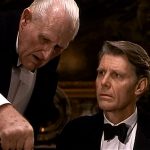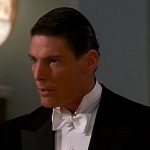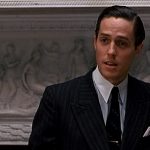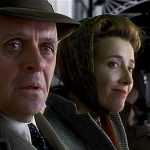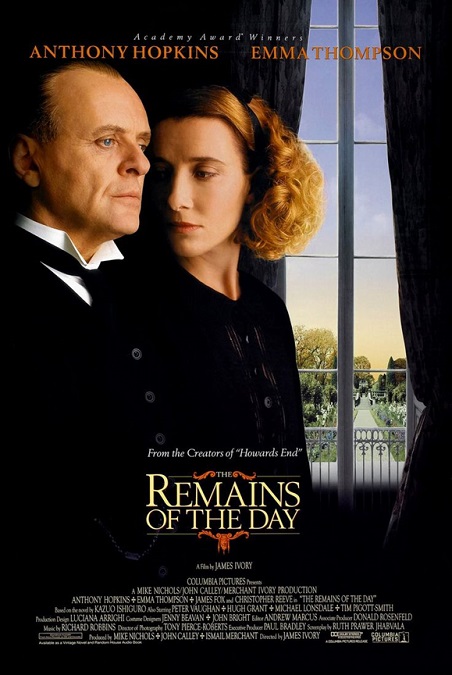
Remains of the Day – 1993
Merchant Ivory is at it again, but at least this time it was a step above the rest. It was a British period drama that did not deal much with class. Sure the issue of class was mentioned, but it wasn’t the focus. True, we brought back a few of the same actors like Anthony Hopkins and Emma Thompson, but it dealt with a butler who sees his master becoming an unwitting Nazi sympathizer in the years leading up to World War II.
Hopkins played Mr. James Stevens, butler to Lord Darlington, played by James Fox. The housekeeper, Miss Kenton, is played by Thompson. The story takes place in both the past and the present. The present follows Stevens, who now works for the American, Congressman Jack Lewis, played by Christopher Reeve. Stevens is exchanging letters with the old housekeeper, Miss Kenton, who has long since gotten married and moved away. As Mr. Lewis wants to revitalize the house and bring his wife across the ocean to live with him, Stevens has intentions of asking Miss Kenton to return to the mansion to resume her former duties. Mr. Lewis loans Stevens his car so that he can go to the West Country to find her and make his request.
As Stevens makes his way across England, he runs into people who cause him to reminisce about his earlier days, days in which he met and hired Miss Kenton, worked for Lord Darlington, saw him hosting political meeting, consorting with questionable German guests, becoming associated with the wrong kind of people. But as the butler it was never his place to have an opinion concerning his employer’s friends or confidants. He was a man who made it his personal policy to never reveal his own feelings, opinions, emotions, or political convictions. He is so strict with this code of ethics that he nearly becomes incapable of having his own emotions or opinions. It is revealed that this makes him a very lonely man.
Hopkin’s performance was phenomenal. He is one of those rare actors who is able to throw his heart and soul into a character, making him seem so real and believable. It is easy to become invested in the characters he plays. By the time he finally finds Miss Kenton, and asks her to return to Darlington Hall with him, we have already learned that she is in love with him. Despite the fact that she is married, though separated, we know that she would accept his offer but for two things. First, she has recently learned that she has become a grandmother, and she needs to stay where she is to be near the child. Second, Stevens still doesn’t know how to express his feelings for her, feeling which we know lie under his emotionless exterior.
The film was nominated for 8 Academy Awards, though it didn’t win a single one. It was nominated for Best Actor for Hopkins, Best Actress for Thompson, Best Art Direction/Set Decoration, Best Costume Design, Best Director for James Ivory, Best Music/Original Score, Best Adapted Screenplay, and Best Picture. Unfortunately, five of those nominations were lost to Schindler’s List. It is kind of hard to complain about competition like that. Hopkins lost to Tom Hanks in Philadelphia, and Thompson lost to Holly Hunter in The Piano. Again, fair enough. But having never seen Age of Innocence, I can’t comment on the Best Costume Design category.
The film’s score, written by Richard Robbins, was very dramatic and melancholy. It gave the entire movie the feel of sadness and regret, loss and resignation. It was beautiful and emotional, and really did its job effectively. Also, in addition to the four main actors, other recognizable names held supporting rolls, names like Hugh Grant, Peter Vaughan, Paula Jacobs, Ben Chaplain, and Lena Headey. Everyone did a fine job and played their parts well.
In my research, I found that in addition to the original book and the movie, there was a stage musical adaptation that played in London in 2010, though it only ran for a month. Kazuo Ishiguro, the author of the novel, was quoted as saying, “This is a small scale thing and I might feel more cautious about it if the film version hadn’t been such serious, faithful adaptation.”
As for the movie’s differences from Ishiguro’s source material, I am happy to say that there were very few changes. Some of the timelines were sped up0 or condensed, which makes sense for a film adaptation, and there were a few combined characters, also pretty standard. But it was the character of Lord Darlington’s motivations that made the biggest difference. In the movie, he was portrayed as a well-intentioned fool who was duped or seduced by the Nazis. In the book, he was very much aware of what he was doing. And on top of that, Stevens was also not as blind or deaf to what was going on, or to the people with whom his employer associated.
This movie could have so easily been another carbon copy of the other period dramas by Merchant & Ivory, but it easily exceeded the others in form and content. It was more than a simple period piece. It was good drama.


